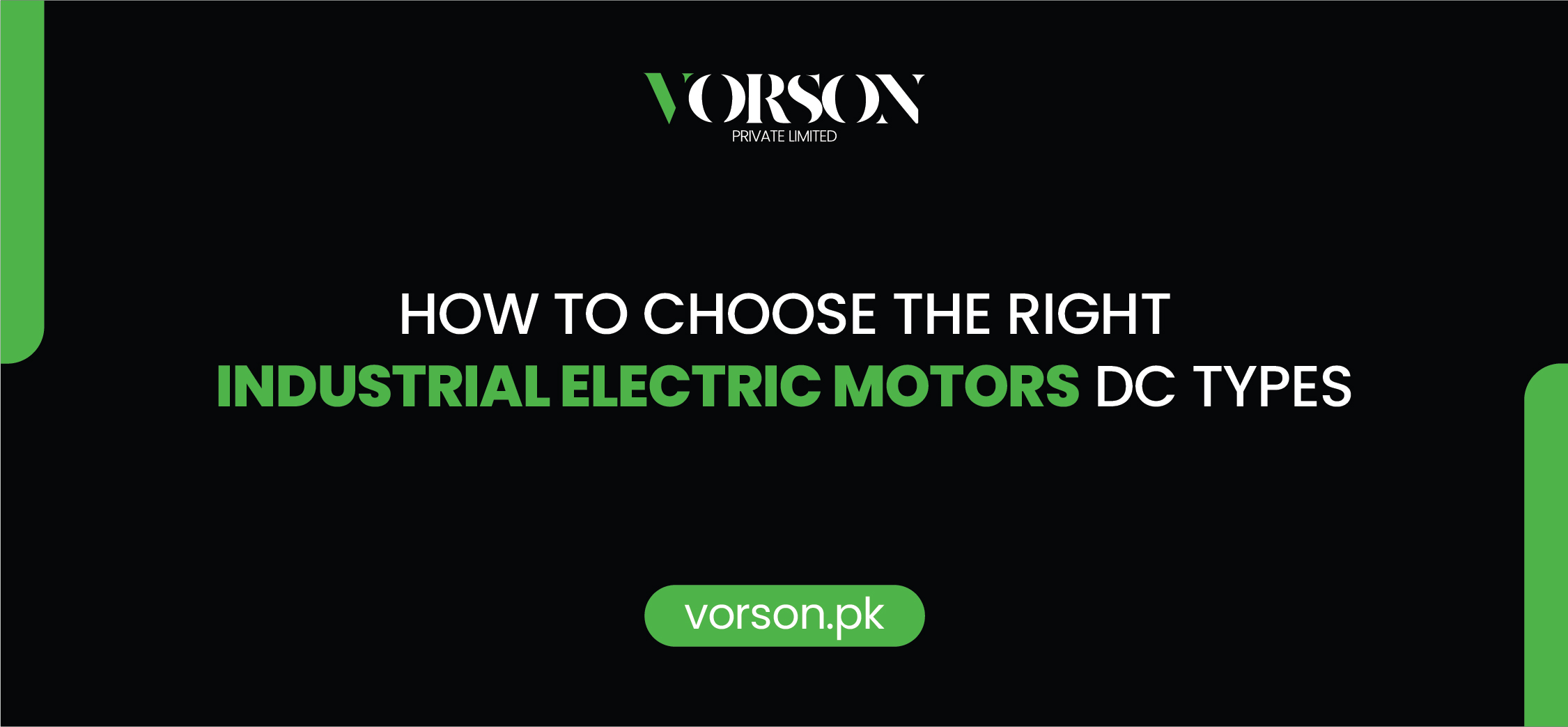Blog

Asif Tariq
2 July, 2024
How to Choose the Right Industrial Electric Motors DC Types
The performance and efficiency of your operations can be much improved by selecting the correct industrial electric motors more especially, DC models. Popular in many different industrial uses, direct current DC motors are known for their dependability, great efficiency, and exact control. Making a wise choice requires knowledge of the several kinds of DC motors as well as their particular advantages and disadvantages.
Types of DC Motors
Direct current DC motors are used to transform electrical energy into mechanical motion. Main forms of DC motors utilized in industrial contexts are:
Brushed DC Motors
Among the first and most often used forms of DC motors are brushed ones. They comprise a revolving armature, a commutator, brushes, and either a permanent magnet or electromagnet.
The simplicity and economy of these motors appeal. In many industrial environments, their simple design makes them easy to comprehend and repair. Furthermore, they are perfect for uses including conveyor belts and cranes since they offer great torque at slow speeds. Still, they need frequent maintenance since the brushes and commutators gradually lose their quality. Brushes and the commutator can also spark, hence they are not fit for explosive surroundings.
Brushless DC Motors (BLDC)
As the name suggests, brushless DC motors lack brushes. Rather, they vary the motor windings’ current using an electronic controller. Among numerous advantages this design produces are more efficiency and durability. These motors run less wear and tear without brushes, therefore extending their lifetime and reducing their maintenance needs.
They also fit continuous operations since they are less heat producing and more efficient than brushed motors. Additionally, quieter operation of brushless DC motors is beneficial in noise-sensitive surroundings. They often cost more, though, and call for a more sophisticated controller.
Series DC Motors
Series DC motors link their field windings in series with the armature. High starting torque made possible by this arrangement makes them perfect for uses such as elevators and electric trains that call for large torque to start. In some uses, the slowing down of series DC motors as the load rises may be advantageous. Their speed can be erratic under different loads, hence they are less appropriate for uses requiring a steady pace. Furthermore, series DC motors run at dangerously high speeds without a load, hence maybe inflicting harm.
Shunt DC Motors
Good speed control comes from shunt DC motors’ field windings being connected in parallel with the armature. For uses like machine tools and conveyors, this arrangement lets them keep a consistent speed under different loads—perfect for Shunt DC motors let one easily modify speed by varying the field current. Their employment in high-torque beginning applications is limited, nevertheless, by their lesser starting torque relative to series motors. For high-torque uses, they are also less efficient than series motors.
Compound DC Motors
Compound DC motors combine the characteristics of both series and shunt motors by field winding connected in both series and parallel with the armature. They are flexible for a broad spectrum of uses since their mix offers a compromise between great starting torque and steady speed. Compound DC motors allow one to modify their properties such that they highlight either torque or speed stability depending on particular needs. Their growing complexity, however, can result in more maintenance calls and higher expenditures.
Choosing the Correct DC Motor
Several criteria have to be taken into account while choosing the correct DC motor for your industrial use:
Load Requirements
Understanding the torque and power requirements of your application is crucial. Series or compound motors may help elevators and other devices needing great beginning torque. Conversely, shunt motors may be more appropriate for uses requiring continuous speed, including conveyors.
Speed Control
Should exact speed control be required, brushless and shunt DC motors provide superior control than series motors. In situations where output depends on a steady speed, this can be crucial.
Maintenance and Durability
Think on the estimated motor lifespan and maintenance requirements. Because they lack brushes, brushless DC motors can have a longer lifespan and require less maintenance. Reduced downtime and less long-term costs follow from this.
Operating Environment
Still another crucial consideration is the surroundings the motor will run in. Brushed DC motors run the danger of sparking and should be avoided in perhaps explosive surroundings. In such environments, brushless DC motors—whose lower maintenance and sparking risks—may be more suited.
Cost
One must strike a balance between the initial outlay and the long-term running expenses. Although brushless DC motors could be more expensive initially, their efficiency and low maintenance requirements can save over time. Review your budget and think through the motor’s lifetime total cost of ownership.
Efficiency
In the long run, more sustainable options are higher efficiency motors since they can lower running expenses and energy usage. In sectors where the running budget heavily consists on energy expenses, this is particularly crucial.
Choosing the right DC motor for your industrial application involves a thorough understanding of the unique characteristics and benefits of each type of motor. Though they demand regular maintenance, brushed DC motors provide simplicity and economy. Higher initial cost brushless DC motors offer great efficiency and durability. While shunt DC motors provide consistent speed control, series DC motors have great beginning torque. Compound DC motors provide a flexible balance of both qualities.
Carefully assessing your particular needs, load, speed control, maintenance, environment, cost, and efficiency, will help you choose the best DC motor to maximize performance, lower downtime, and raise the general running efficiency of your operations. For your industrial uses, spending effort selecting the correct motor might pay you handsomely over long terms.


